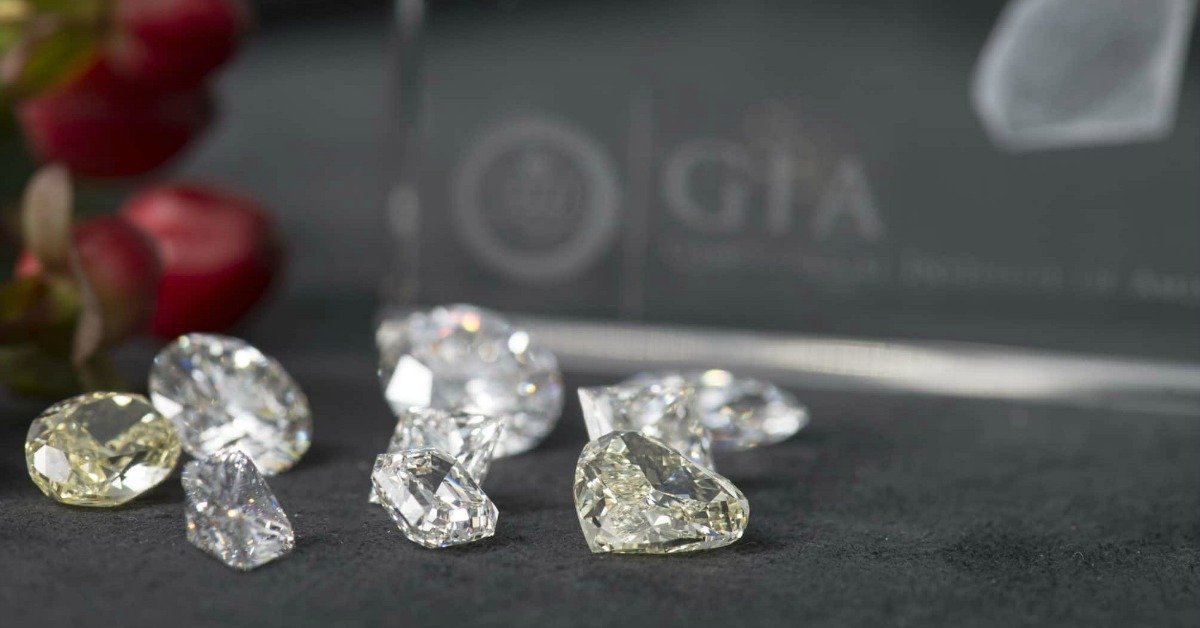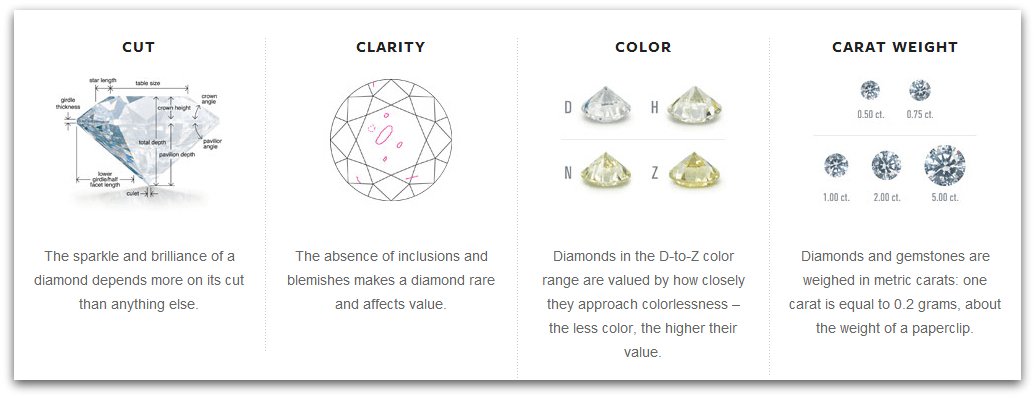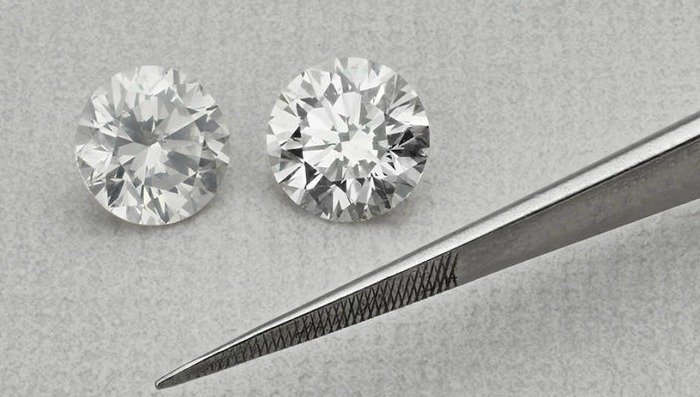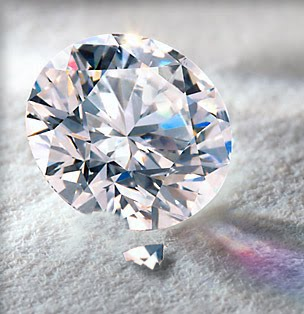
Sam: “Good morning, I want to manufacture my ring with you, but can I source the diamond myself?”
OK.
Sourcing a diamond, at first glance, seems pretty straight forward.
You learn the basics of diamonds, get quotes, compare them and take the best priced option. Then you head over to your jeweller of choice to have it made up into an engagement ring or whatever piece of jewellery you’re looking for. Simple as that?
Unfortunately, no. I’ve seen it play out hundreds of times.
I understand the slew of jewellers and diamond sellers online encourages you to mix and match diamonds and jewellers. I guess I would have thought along those same lines.
Finding a diamond at that elusive bargain price, and then a decent jeweller to have it set up in a perfect ring will turn out to be a time-consuming and risky endeavour with very little upside.
Can You Really Source The Same Diamond For Cheaper? (Beyond The 4C’s).
Not feeling on top of the 4C’s(Colour, cut, clarity, carat)? Click here for a quick recap.
“Wholesale Prices”
Just because someone offers better prices than an overpriced mall-based jeweller doesn’t make them “wholesale” by any stretch of the imagination. Regardless of what an advertisement might say.
The real, international diamond trading platforms aren’t open to the public or anyone who can’t buy numerous diamonds every month. On repeat.
It’s about much more than the 4C’s.
 Although mastering the “4C’s” is a good first step to understanding what affects the price and appearance of diamonds, this remains an overly basic framework for comparing diamond quotes.
Although mastering the “4C’s” is a good first step to understanding what affects the price and appearance of diamonds, this remains an overly basic framework for comparing diamond quotes.
As a diamond dealer I would never ever purchase a diamond based only on the 4C’s. There are so many more variables that my chest draws tight just thinking about it.
When I started buying and selling diamonds about 12 years ago this was the first hard lesson I learned.
I bought some diamonds from a local gent who was selling the latest diamonds he cut and polished in his factory. His name was Ben.
Prices were excellent that day and I bought three diamonds. Two 1,00 carat diamonds and a 0,76ct. G and H colour. Very nice.
I proudly marched over to my father (an industry veteran of 35 years at that stage) to brag about my score.
“They’re milky” he sighed.
“They’re what?” I asked confused. Come on… I’ve been doing this for a 100 days give and take.
“Milky… hazy, foggy… milky.”
Oh no.
It took the whole of one second for me to see… he was right. I was looking at the certificates and scanned the diamonds with my eyes just to verify the colour and clarity/purity. I just slipped on checking for milkiness.
*Can you see the diamond on the left is cloudy and milky? That kills all the life and brilliance.

But there aren’t returns in this wholesale story.
8 years later we sold them off to an Israeli company who traded in lower quality “goods”. At a massive loss of course. It was a bitter pill to swallow, but I learned those lessons and these days verifying the certificate is the least of my worries. I have a new set of questions including;
- Does the stone emit fluorescence? (can be good, bad or a non-event)
- What is the polish and symmetry grading? (Needs to be at least “Very Good”)
- Is it an ECG? (can be a good thing)
- Which laboratory graded the stone? (not all grading laboratories stick to high standards)
- Is the stone milky? (Lesson learned I hope)
- Does the diamond have black table inclusions? (bad)
- Where was the diamond mined?
- Is there internal tension in the diamond (looks like a dispersing rainbow and creates a cracking risk)
You can have two diamonds that seem identical according to the grading certificate at first glance but vary greatly in appearance and value.
Depending on the answer to these questions, I can walk away from any diamond even if the price seems amazing.
Let me rephrase.
Depending on the answer, a seemingly good deal can turn out to be disastrously expensive.
You don’t have to spend months researching these questions. If you use an honest, well known, reputable jeweller you interject someone with a name on the line then there’s something at stake for everyone.
We, for instance, offer 100% credit when someone upgrades to a diamond purchased from us to one of a higher value. If I sell a low quality diamond I might have to buy it back in a few months time when you wish to upgrade. I don’t want to sit with a safe full of inferior diamonds… believe me.
Manufacturing Quotes Will Be Higher Everywhere If You Supply The Diamond.
Helping a customer pick the perfect diamond rarely takes more than an hour. This is by far the most profitable part of an engagement ring sale.
That’s why many businesses you encounter will be all too happy to just sell you the loose diamond and be on their way.
But this is where you’ll run into… unforeseen circumstances.
The profit made on the diamond sale subsidises the manufacturing element of the engagement ring quote to a certain extent.
Finalising an engagement ring design is often hard work. If a jeweller doesn’t make a decent profit on the diamond sale it’s hard to justify the manufacturing and design effort without inflating prices.
Some jewellers actually double prices on their settings/mounts/rings if they don’t supply the main diamond. Some jewellers don’t work with diamonds they didn’t supply. You’ll quickly see how your list of jewellers becomes smaller.
These higher manufacturing charges can very easily erode the meagre savings that you enjoyed by sourcing the diamond yourself.
And now I’m assuming you didn’t buy a dud diamond, and actually sourced it at a great price.
Then there’s the risk.

The elephant in the room you were probably 100% oblivious to.
Certain diamonds have an increased tendency to crack and chip during the process where they’re secured in place by the jewellery piece’s metal prongs or claws. This risk can be minimised, but never eliminated. If your jeweller supplies the diamond, he inherently assumes the risk and has to replace the stone if it’s damaged during any process.
On the other hand; if you supplied the diamond yourself – the risk is all yours. No jeweller will accept responsibility for a diamond he didn’t sell.
Luckily diamonds don’t crack frequently… but why take the risk?
Where to from here?
Although sourcing your diamond from your friend’s uncle’s cousin might seem like sheer brilliance at first – it’s most probably far more risky than you would initially imagine.
Save yourself from a massive headache; pick a reputable jeweller and use a single entity for the complete engagement ring purchase. You’ll probably end up spending less and your stress levels will be much lower.
There is great peace of mind in knowing that prominent jewellers are much larger than just a single deal.
You’ll have checks and guarantees in place – and a commitment to your satisfaction with the complete engagement ring purchase. No room for blame shifting.
Thank you for reading!
You can browse the best diamond deals in South Africa HERE.
And if you’re in the market for an engagement ring – please email me (link) for the best deal – first time round.

